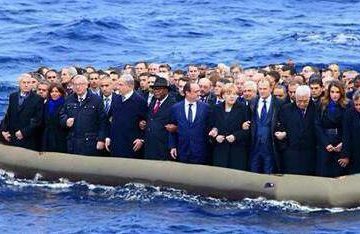- About
- Topics
- Picks
- Audio
- Story
- In-Depth
- Opinion
- News
- Donate
-
Signup for our newsletterOur Editors' Best Picks.Send
Read, Debate: Engage.

| located: | Germany, Italy |
|---|---|
| editor: | Vanessa Ellingham |
With the news that an estimated 700 migrants drowned in the Mediterranean from one capsized boat over Saturday night and Sunday morning, the total number of deaths this year on the world's deadliest migrant journey has risen to 1600 - and it's only April.
If the numbers are confirmed, this latest capsizing will be the largest loss of life on any migrant journey in the Mediterranean, according to the UNHCR, and comes after another 400 migrants died in a separate boat incident on the same sea last week.
When EU leaders meet tomorrow they will be forced to decide what is more important: keeping people out or keeping people alive.
While it is clear that responsibility for unstable governments, persecution against minorities, violence, war and poverty all rest in the countries where they take place, Europe still has a responsibility to protect those who seek asylum on its shores.
Médecins Sans Frontières is helping to coordinate rescue efforts in the Mediterranean. Its President Dr Joanne Liu, who was recently named one of Time magazine's 100 most influential people, lauded for her leadership in working to contain Ebola, tweeted during Saturday night's rescue: "A mass grave is being created in the #Mediterranean. European States are responsible for this! #migrants". Her words were echoed by Amnesty International, which described the disaster as a predictable "man-made tragedy".
Some on social media preferred to express their disdain at the EU leadership visually, such as in the photoshopped image above, which shows EU leaders crowded tightly together on a boat at sea.
Ahead of tomorrow's meeting, we have collected a range of ideas we believe the EU leadership should take note of when considering how to solve the Mediterranean migrant crisis.
1. Did you know that when you Google, "how to solve the Mediterranean crisis" the first search result is Katie Hopkins, a writer for tabloid newspaper the Sun, recommending the use of gun boats trained on vessels carrying African migrants, who she has likened to cockroaches? The way she refers to these people, many of whom will have valid claims of asylum, reeks of Nazi rhetoric.
2. There is a petition to have Hopkins removed from the newspaper, but her other suggestion to “burn all the boats in North Africa” was actually suggested (though probably not credited to her) at Monday's emergency meeting of EU interior and foreign ministers in Luxembourg. One result of that meeting was the decision to ramp up military action against people smugglers in Northern Africa, dropping the blame squarely on the shoulders of those who profit from transporting migrants across the Mediterranean. But then what would happen to the people fleeing persecution, violence, and war?
3. A real-life smuggler posed the same question when he was interviewed by the Guardian. He scoffed at the EU's plans to launch a military campaign, saying their resources would be better spent supporting oppressed groups in countries like Libya, targeting the root cause of people's desire to flee. Having graduated with a law degree but unable to find work, Hajj said he related to others attempting to flee a lack of opportunities. For him it was an easy choice to take up smuggling, which could be highly lucrative - he said he might earn $22,000 per boat he sent off. It would certainly be unconventional to take advice on solving a humanitarian crisis from a people smuggler, but it's the best suggestion we've heard yet.
4. Unfortunately the opinion of a people smuggler doesn't tend to hold resonance in the same way the views of a world leader does. Australian Prime Minister Tony Abbott has suggested Europe follow his government's example by refusing to accept any migrant boats on to their shores. As we have previously reported, Australia's 'Stop the Boats' campaign has been criticised by the UN for sending the persecuted back to their persecutors, potentially breaching international law by redirecting migrants to offshore processing centres in other countries where their basic needs cannot necessarily be met. This is definitely not an option for the EU, which regards itself as a leading body on human rights. A 'stop the boats' policy would only serve to further embarrass an already red-faced EU leadership.
5. Another sensible idea is to invest in the safe, legal passage of migrants from the coast of North Africa to Europe. Bernd Riegert at Deutsche Welle suggests making this migration route possible without smugglers by providing a legal ferry. This option may be costly but it would certainly be comparable to the cost of a military sea blockade and, more importantly, it would actually save lives - UNHCR says this should be the top priority.
We can only hope EU leaders were listening.